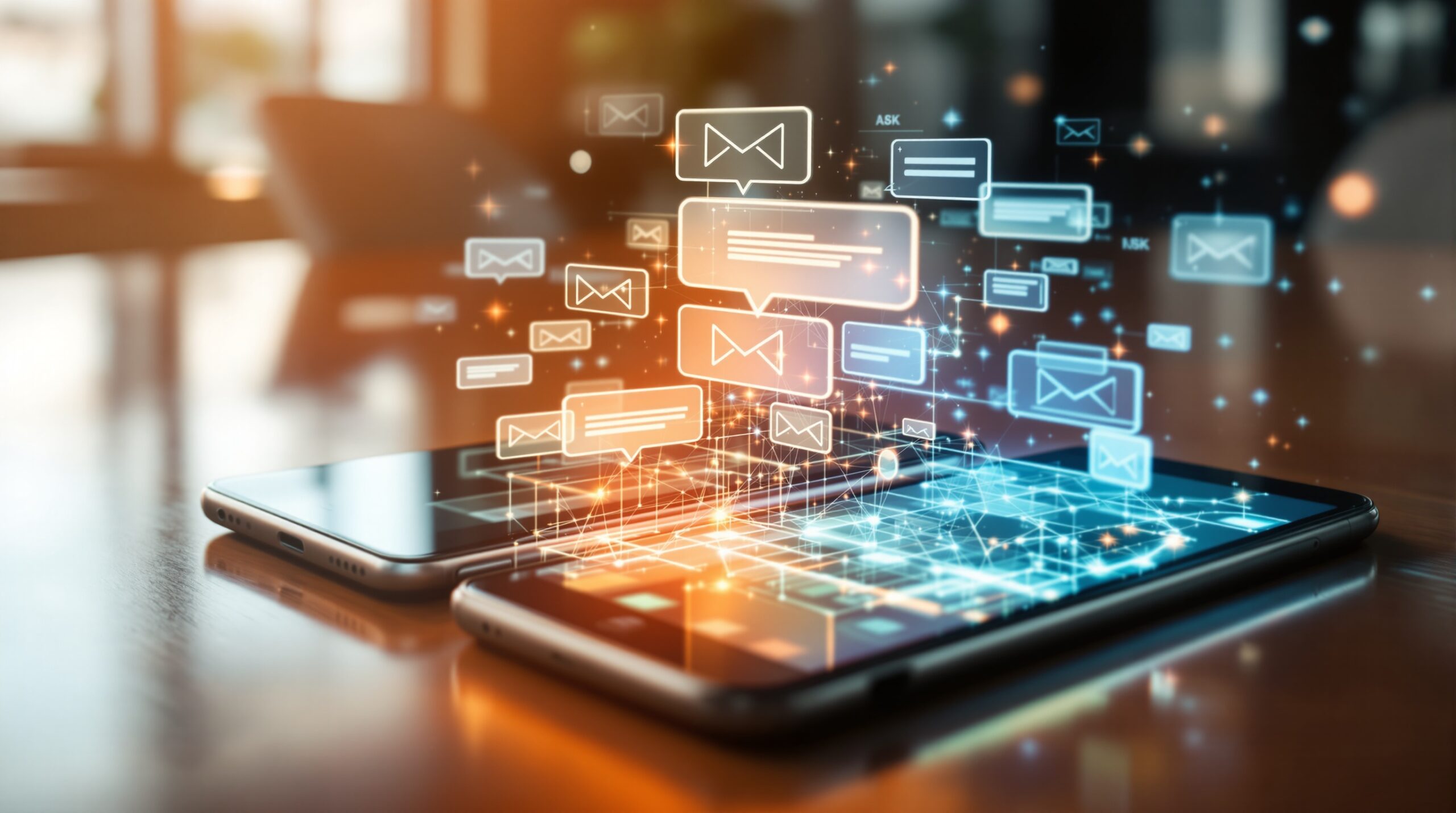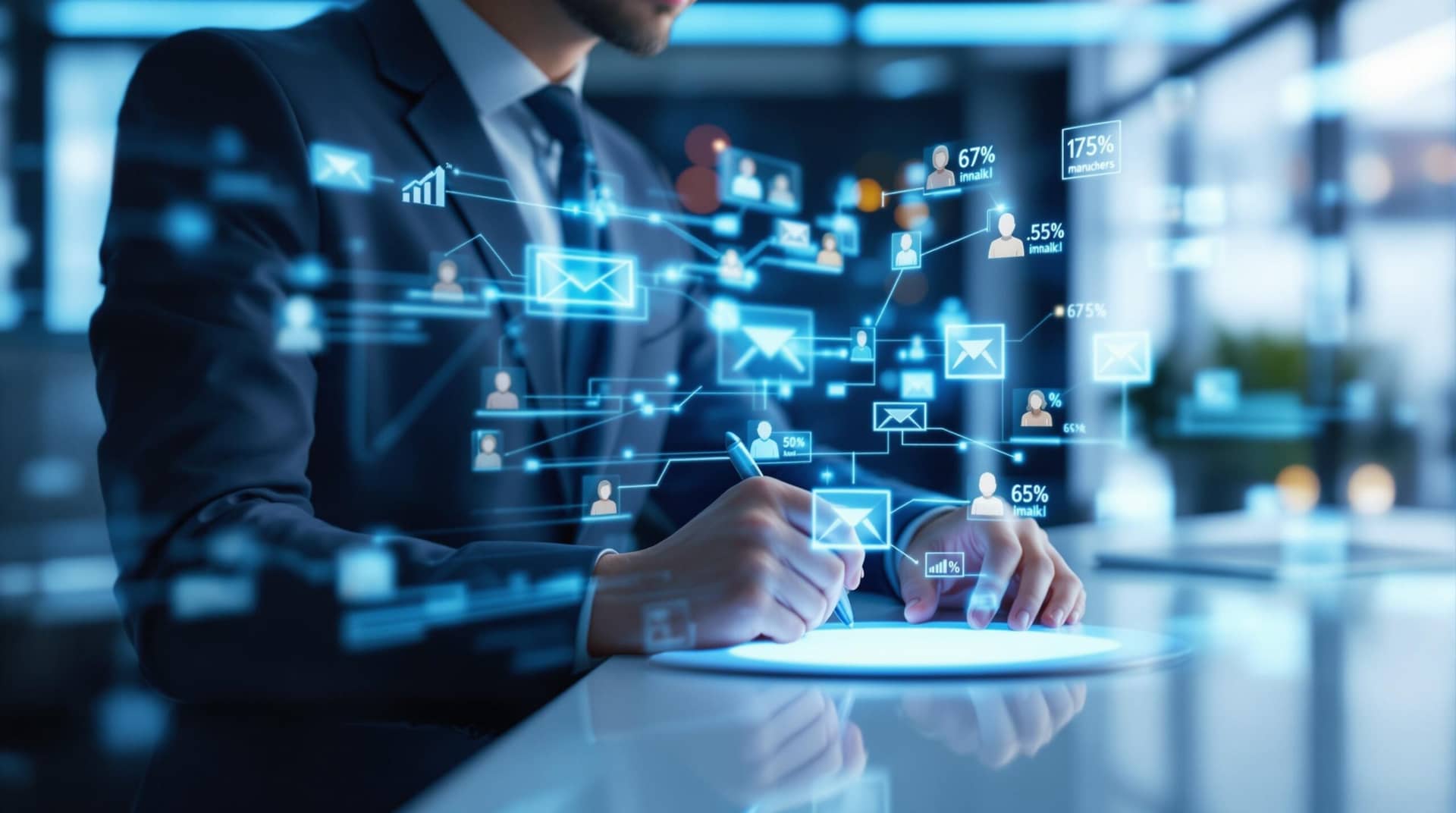Most professionals have moments when they stare at a blank email draft, knowing exactly what needs to happen but unsure how to say it. The message matters—it carries weight for a relationship, a project, a decision—but finding the right words feels harder than it should. AI email generators now promise to solve this problem, using large language models to draft messages that match your voice and timing. These tools handle everything from diplomatic reminders to executive summaries, serving account executives maintaining follow-ups across time zones and leaders crafting updates for diverse stakeholders. Yet their growing presence raises questions that efficiency metrics alone cannot answer: How do AI-generated communications affect the trust that professional relationships require? What happens when the person on the other end discovers the message they read as personally crafted came from algorithmic assistance?
AI email generators are not simple automation—they are systems that learn from your past correspondence to replicate your voice, tone, and decision-making patterns. According to research from Superhuman, these systems now analyze communication history to match individual tone and suggest optimal timing, with applications spanning cold outreach, internal updates, and customer service responses. The technology has moved beyond novelty into practical deployment, yet its impact on long-term professional relationships demands careful consideration from leaders committed to integrity. This article examines how ai email generators work, their strategic applications, and the ethical frameworks necessary to use them without sacrificing genuine human connection.
Quick Answer: AI email generators are tools that use large language models to draft, refine, and personalize professional correspondence by analyzing your past emails and context. They work best when amplifying human judgment rather than replacing it, helping professionals maintain consistent communication quality while preserving authentic relationships.
Definition: AI email generators are software systems that analyze communication patterns and user-provided context to produce draft correspondence matching individual voice, tone, and organizational standards.
Key Evidence: According to Mailmeteor, these tools analyze communication history to match individual tone and suggest optimal timing, with applications spanning cold outreach, internal updates, and customer service responses.
Context: The technology refines user-provided context rather than inventing content from scratch, placing accountability squarely with the professional using it.
AI email generators work because they externalize the mechanical aspects of drafting while preserving your strategic judgment. The system analyzes your past correspondence to learn patterns in how you open messages, structure requests, and close with next steps. When you provide context about the current situation, the tool generates a draft matching those learned patterns. The benefit comes from speed and consistency, not from inventing content you haven’t considered. What follows will examine how these tools function in practice, where they add genuine value to professional relationships, and what boundaries leaders must establish to use them with integrity.
Key Takeaways
- AI refines rather than invents – tools rework your context instead of generating from scratch, requiring human input for accuracy according to HeyMarket
- Personalization through pattern recognition – systems analyze past correspondence to match your specific tone and phrasing as documented by Superhuman
- Integration with workflows – CRM triggers and behavioral analytics transform isolated efficiency into systemic relationship management
- Current limitations demand judgment – tools lack external data-pulling and require human review for high-stakes communications
- Best practices emphasize collaboration – treat AI as thought partner, not replacement, using efficiency gains to deepen relationships
How AI Email Generators Work and What They Actually Do
AI email generators are not content inventors. They are refinement systems. Research from HeyMarket shows these tools rework user-provided context rather than generating from scratch, requiring human input for foundational information. You provide the situation, the recipient, the objective, and any relevant background. The system produces a draft based on those inputs combined with patterns learned from your past emails. This design establishes a boundary where accountability remains with the professional using the technology.
Maybe you’ve noticed how your emails to certain stakeholders always start with a warm greeting before business content, while messages to others get straight to the point. AI email generators notice these patterns too. Tools like Superhuman and WriteMail.ai analyze your past email correspondence to match user-specific tone, phrasing patterns, and communication style preferences. According to WriteMail.ai, this style-adaptive approach means the output feels authentically yours rather than generic. The system learns not just vocabulary but decision-making patterns around formality, directness, and closing warmth.
Common applications reveal where these tools deliver practical value. Sales teams use them for follow-ups that maintain relationship continuity without requiring manual drafting for every touchpoint. Leaders deploy them to transform dense meeting notes into stakeholder communications with clear action items. Customer service representatives scale personalized responses during high-volume periods. Research from Toolsaday documents use cases spanning apology letters, diplomatic reminders, and executive briefings distilled for clarity.
Current constraints matter as much as capabilities. Tools lack external data-pulling abilities—they cannot autonomously research contacts or pull relevant context from organizational knowledge bases. High-stakes communications require human review because alignment with organizational values demands judgment these systems cannot replicate. The technology works within boundaries users provide, making prompt quality and ethical framing necessary success factors.

Major Platforms and Their Strategic Approaches
Superhuman offers context-aware assistance integrated with Gmail and Outlook for professionals managing high-volume correspondence. The platform emphasizes tone matching and personalization based on communication history. WriteMail.ai provides real-time suggestions for clarity and tone during composition, functioning as an active writing partner rather than batch generator. Microsoft Outlook brings enterprise-scale tone adjustment capabilities to millions of existing users through integrated AI features. AImReply specializes in subject line optimization and on-brand messaging according to their platform documentation. Each approach reflects different assumptions about where AI adds value in the communication process.
Strategic Applications That Preserve Relationship Integrity
For routine correspondence—meeting confirmations, status updates, scheduling logistics—AI generators handle mechanical drafting that consumes time disproportionate to relational value. Research from Toolsaday shows professionals reclaim hours by automating these transactional messages while maintaining voice consistency. The saved time becomes available for work requiring judgment and creativity. This represents appropriate delegation where efficiency serves rather than substitutes for human attention.
Customer service contexts benefit when AI ensures response promptness and tone calibration across team members with varying experience levels. New representatives can deliver communications matching the diplomatic polish of veterans by using tools trained on past successful interactions. The technology scales relationship quality during growth phases when hiring outpaces training capacity. However, escalations involving upset stakeholders or complex problem-solving require human wisdom. AI cannot navigate emotional nuance or make judgment calls about exceptions to policy. You might notice your team defaulting to AI-generated responses even when situations call for personal attention—that pattern signals misalignment between tool capability and communication context.
One common pattern looks like this: A sales professional starts using AI for follow-up efficiency, sees immediate time savings, then gradually expands usage to initial outreach and relationship-building conversations. Response quality drops subtly. Prospects sense something generic in messages that look personalized but lack genuine curiosity about their specific challenges. The relationship never deepens beyond transactional. This happens because AI excels at personalizing templates with contact-specific research summaries and maintaining consistent follow-up sequences, but it cannot build genuine curiosity about prospect challenges or craft insight demonstrating deep industry understanding.
Professionals who use AI for drafting efficiency while investing saved time in stakeholder research create sustainable competitive advantages. Those who automate relationship-building itself produce detectable inauthenticity that undermines trust. The difference shows in response quality and relationship durability over time. Account executives use these tools to maintain relationship continuity across global time zones, ensuring prompt follow-ups that match the polished tone of more experienced colleagues. Leadership communications benefit when AI transforms dense meeting notes into stakeholder updates with clear action items that respect recipient time. Both applications work because they address mechanical challenges while preserving space for strategic thinking about what stakeholders need to know and why it matters.
Common Mistakes and Best Practices
Over-reliance without review produces messages that miss contextual nuances. The system might suggest enthusiasm when sobriety fits the situation, or propose solutions to problems already resolved. The misconception that AI invents content leads users to abdicate judgment, treating generated drafts as finished products rather than starting points requiring discernment. Organizations implementing AI without training create quality control gaps where misaligned messages reach stakeholders unchecked. Begin with strategic prompts encoding your values, audience context, and communication objectives. Review generated drafts not for grammatical correctness but for alignment with relationship history and organizational character. Edit to restore specificity and personal touches that signal genuine attention. Use efficiency gains to increase communication frequency with key stakeholders rather than simply reducing time investment.
Emerging Trends and Integration with Relationship Management
Recent developments show AI email communication evolving from standalone efficiency tool toward integrated relationship management infrastructure. Research from Haye AI documents CRM integration for automated email sequences, workflow triggers based on contact behavior, and real-time multilingual support. Organizations increasingly deploy multi-tool stacks handling everything from initial ideation through post-send analytics, treating email as data-rich touchpoint rather than isolated transaction.
The combination of ai email generators with workflow automation creates systems that reshape entire communication strategies through behavioral analytics and predictive response optimization. Tools now suggest optimal send times based on recipient engagement patterns. Analytics track which messaging approaches generate desired responses, creating feedback loops that refine future communications. This evolution transforms AI from standalone tool to embedded infrastructure within relationship management ecosystems.
Generic templates that plagued early automation give way to systems learning individual voice patterns, producing output indistinguishable from human-drafted correspondence. Tools analyze years of past emails to replicate not just tone but decision-making patterns around greeting formality, directness levels, and closing warmth. This capability promises consistent relationship quality even as communication volume increases, though it raises questions about whether recipients can or should distinguish AI assistance from fully human effort.
Predicted near-term capabilities include autonomous contact research, automatic incorporation of organizational knowledge, and real-time suggestion of relationship-strengthening elements based on recipient history. These advances will pressure professionals to articulate clearer boundaries around when authentic human presence matters non-negotiably. Forward-thinking leaders ask not whether to use AI but which communication contexts benefit from efficiency versus which require unreplicated human attention. That discernment represents the leadership challenge these tools create.
Ethical Considerations and Unanswered Questions
Peer-reviewed studies examining long-term impacts of AI-generated correspondence on professional relationship trust remain absent. We lack empirical data quantifying how stakeholders respond when they discover communications they perceived as personally crafted were AI-assisted. No research explores whether cumulative exposure to AI-generated messages subtly degrades the relational foundation that email historically helped build and maintain. These knowledge gaps leave leaders navigating decisions with significant trust implications without empirical guidance.
What responsibilities do professionals have toward disclosure when AI substantially shapes correspondence? The question lacks settled answers. Current tools require human review for high-stakes communications because they lack the external data and contextual awareness necessary for nuanced ethical territory, as documented by HeyMarket. Technology cannot navigate these situations without human wisdom, clarifying the irreplaceable role of character and discernment in leadership.
Recipients increasingly encounter AI-generated correspondence without knowing it, raising questions about informed consent and relational authenticity. If trust depends partly on knowing the other person invested personal attention in communication, does AI assistance without disclosure represent a form of relational deception? The question matters more as these tools become standard practice. Organizations risk normalizing practices that subtly erode the trust foundations they claim to value when technology adoption outpaces ethical reflection.
The framework principle that should guide deployment is straightforward: use efficiency gains to strengthen, not shortcut, genuine human connection. AI works best when it handles mechanical aspects of communication, freeing your attention for the relationship-building work that genuinely requires your wisdom and character. That boundary keeps technology in service of integrity rather than substitution for it. For more on maintaining ethical standards in AI-assisted communication, see our article on ethics in business writing and communication.
Why AI Email Communication Matters
Professional email remains foundational to how trust gets built and maintained across distance and time zones. The efficiency these tools provide creates genuine value when deployed with discernment. Leaders who treat AI as collaborative partner rather than replacement can scale personalized communication without sacrificing relationship quality. That capability matters in organizations where stakeholder relationships determine success but time constraints limit how much personal attention each interaction can receive. The technology creates space for deeper engagement by handling routine correspondence efficiently. For insights on balancing automation with human judgment, explore our guide to human-AI collaboration.
Conclusion
AI email generators represent powerful tools for maintaining communication consistency and scaling personalized outreach, but their value depends entirely on how leaders deploy them within existing relationships. The technology works best as collaborative partner rather than replacement, amplifying human judgment, preserving authentic voice, and creating space for deeper stakeholder engagement through efficiency gains. Professionals committed to integrity-driven leadership must navigate these tools with discernment, establishing clear boundaries between contexts requiring efficiency and those demanding unreplicated human presence.
Consider evaluating your current email communications to identify where AI can handle mechanical drafting, freeing your attention for the relationship-building work that genuinely requires your wisdom and character. The question is not whether these tools will become standard practice but whether leaders will use them in ways that strengthen rather than substitute for the human connection that makes professional relationships meaningful. For a broader perspective on AI writing tools, see our overview of AI email writing tools. What boundaries will you establish so efficiency serves relationship depth rather than replacing it?
Frequently Asked Questions
What are AI email generators?
AI email generators are software systems that analyze your communication patterns and user-provided context to produce draft correspondence matching your individual voice, tone, and organizational standards using large language models.
How do AI email generators work?
These tools analyze your past email correspondence to learn patterns in how you open messages, structure requests, and close with next steps. They refine user-provided context rather than inventing content from scratch.
What is the difference between AI email generators and simple automation?
Unlike basic automation, AI email generators learn from your communication history to replicate your voice, tone, and decision-making patterns, producing personalized output rather than generic templates.
Can AI email generators replace human judgment in professional communication?
No. Current tools lack external data-pulling abilities and require human review for high-stakes communications because alignment with organizational values demands judgment these systems cannot replicate.
What are the best applications for AI email generators?
They work best for routine correspondence like meeting confirmations, status updates, follow-ups, and customer service responses where efficiency matters more than deep relationship building.
Do recipients know when emails are AI-generated?
Most recipients cannot distinguish AI-assisted correspondence from human-drafted emails, raising ethical questions about disclosure and informed consent in professional relationships.
Sources
- Haye AI – Analysis of AI email generator integration with CRM systems and workflow automation capabilities
- Superhuman – Context-aware AI email assistance for Gmail and Outlook users, emphasizing tone matching and personalization
- Toolsaday – Free AI email generation tools focused on efficiency and practical applications
- HeyMarket – Professional email generator capabilities and limitations requiring human review
- Mailmeteor – GPT-based drafting tools and historical evolution of AI email technology
- WriteMail.ai – Real-time writing suggestions and style-adaptive AI email composition
- AImReply – Subject line optimization and on-brand messaging capabilities
- Microsoft 365 – Enterprise-scale AI email features integrated into Outlook


